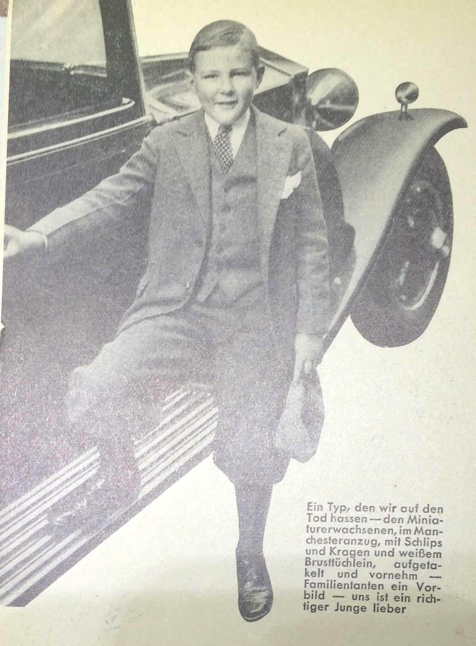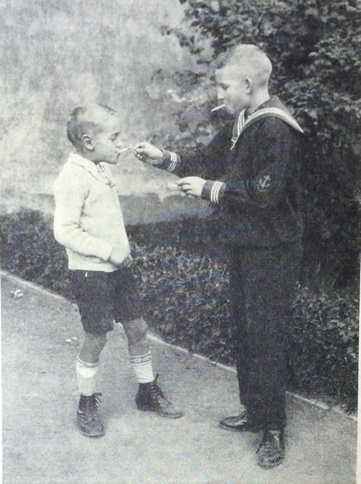


Background: The “Pimpfs” were members of the Nazi organization for young boys, part of the Hitler Youth. This article, from the magazine published for them, addresses those who were less than eager to join the organization.
The source: “He, ihr da! Jetzt geht’s einen anderen Weg!,” Morgen, January 1937, pp. 5-8.
A call to the last who are still slow to change, to the last who still are not serving in the HJ. Serving with us is no longer a political decision or a daring personal choice, but rather the result of a general sense of duty of a self-conscious people. “You walk down the street, you civilians, hands in your pockets, cigarettes in your mouth — you play soccer, or participate in gymnastics and sing. You are pupils or errand boys or apprentices. You go through the day and think that people should leave you alone. We have called to you for months. You, however, have said: ‘It’s all propaganda! We’re a lot better off.’”

You have freedom, you can do what you want, nobody tells you what to do, you can squint when the sun shines and when it rains you can stay home. There you can have a cup of coffee while mother spreads the butter. You’ve got your friends, even if they are sometimes a bother. Can you not see that everything you are doing is a waste of time, that it would be much better if you would march with us. Well, I see that you are making the usual face, perhaps with your hands in your pockets as always when you think someone wants to limit your freedom. How do you look? What kind of a guy are you? You look a bit pale, you don’t stand up straight. Where are you coming from? Which club? Explain.
“Don’t say anything against the club — there are always good stories and games — checkers, halma, Mühlchen [a game I don’t know] — I don’t like Mühlchen because I always lose — and when I’m not having fun I stand up and leave, and no one thinks about stopping me. Lately we’ve been playing foreits and four corners — do you know that? — and how we laughed. And there are books, Peter’s adventures with cannibals, a great book, and we play ping pong — and yeah, I have to tell you so that you’ll know how to treat me — mother had told my teacher that I’m a difficult child.”
“Take that cigarette out of your mouth.”
“And I have way too much to do. My mother doesn’t get much money and there are so many expenses. She says that you are only for the rich people and I’d find myself in a group that would only cause me grief. I spend time with Lotte who works at the green grocer’s. But she’s just a girl and can’t climb over fences either.”
“And you are so rough — and have no education. One has to get ahead, after all. I read books day and night. My father sometimes says: ‘Hey boy, go out into the fresh air, but mother says leave him alone, leave him alone, he has to do well in school. You can do all that later. Who knows, maybe he will become a government minister. Intellectuals don’t get what they need. I have to worry about my pension. And when I have time, there are things like dance lessons. etc.” —

“Well, listen to me. I’m going to tell you something you may already know. It is a simple fable. A farmer had three sons. He was rich and had many possessions. But fighting between his sons spoiled his last days and there didn’t seem to be any solution. The brothers argued, fought with one another, couldn’t look each other in the eye. The neighbors were thinking about who would get the property. In his dying hour he called his sons together and said:
‘I have three sticks in my hand. I can break each of them easily. But look at what happens when I hold all three together in my hand. I can’t do it. You have to be like this bundle of sticks’
Then they understood and joined together, forming a strong community that no one was able to defeat.
This old legend is very simple, just as simple as the meaning of the law that brings the youth together. Individually you will fail, but when you stand together firmly you are invincible.
Whenever our people has been united it stood tall and invincible. The Romans learned that when the Germans suddenly rose up and broke like a terrible storm over the soldiers from sunny Italy. And never forget that Cherusker Count Hermann fell victim to disunity.
Our age is more modern and the enemy causing our disunity is domestic. It is mistrust against someone else who is still a people’s comrade, it is class hatred and class differences — and all that should be rooted out of your ranks — rooted out forever. That is what the law on the Hitler Youth says: “training for the people’s community.” Sons of the “rich,” sons of top civil servants, sons of the middle class — they don’t exist any longer. And if they do, well, they will learn better in the Jungvolk. A group leader makes no distinction when assigning night watch duty in camp, and a boy from the “lower classes” doesn’t care if he beats the son of a director in field exercises.
The quotation from Ernst Moritz Arndt should be displayed in every home: To be a people is the religion of our age.
Page copyright © 2014 by Randall Bytwerk. No unauthorized reproduction. My e-mail address is available on the FAQ page.
Go to the Der Pimpf Page
Go to the 1933-1945 Page.
Go to the German Propaganda Home Page.